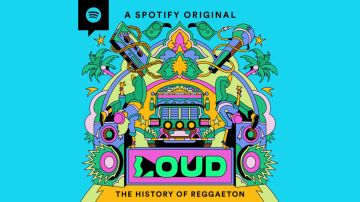“Loud” Podcast Tells the History of Reggaetón Including its Afro-Latin Origins
Growing up on the brink of Reggaetón’s commercial rise, the heavy baseline and quick Spanglish rhymes were the soundtrack to the countless winters in Nueva York and humid summers in the Dominican Republic

Photo courtesy of Spotify
Growing up on the brink of Reggaetón’s commercial rise, the heavy baseline and quick Spanglish rhymes were the soundtrack to the countless winters in Nueva York and humid summers in the Dominican Republic. Despite me being far too young to listen to the vulgar lyrics and watch the eccentric music videos, I took pride in knowing our Latinx people were finally being heard through Reggaetón. It was in those mid-2000s, Bronx whine and AIM era, that I fell in love with Reggaetón. Since then, Reggaetón has expanded its sound and audience across genres and continents that bilingual smash hits like “Mía” by Bad Bunny ft. Drake are the latest pop culture phenomenon. While it is easy to celebrate Reggaetón in all of its glory now, it was and continues to be the soundboard to the grim and powerful lived experiences of black and brown Latinx kids or as Ivy Queen notes in the Spotify Original podcast “Loud”, “the real story of Reggaetón is about la resistencia.”
https://open.spotify.com/show/6OB6xOp1sWazXMMa2z53CZ?si=dbe7dd7773304c0f
Cultivated and narrated by a pioneer of the genre, la Diva, la Potra, la Caballotta herself, Ivy Queen, “Loud” is a Spotify original podcast that showcases the history and unsung culture of Reggaetón. A melting pot between Panama, Jamaica, and Puerto Rico, Reggaetón became the Afro-Latinx fusion from and of the streets. Similar to the origin of Hip-Hop, Reggaetón is a soundwave that was birthed out of the struggles of racism, police brutality, sexism, and poverty. While each episode of “Loud” is honed in on not only recounting Reggaetón’s triumph within the mainstream culture, it also takes a deep dive into the ugly and internal struggles artists continue to face within the genre. “When you create something and you don’t capitalize on it and other people capitalize on it, it doesn’t feel good….even though you created it no one knows who you are,” noted by Raka Rich of Los Rakas, a founder of Reggae en Español. This alludes to the significant disassociation most people have to recognize Reggaetón’s origins in Panama and the global success Puerto Rican artists have had in comparison including Daddy Yankee, considered by many as the “King of Reggaetón”.
In an effort to debunk the myths of Reggaetón, each episode tackles a different stage of the genre and the ugly truths that accompany it. Episode 4 depicts the underground movement brewing in and around las calles of La Perla in San Juan, Puerto Rico. A movement fueled by violence, drug dealing, and political uprise. In particular, the lack of employment available for Puerto Ricans after Clinton’s 1996 tax break, many of the reggaetoneros in the 90s would sell drugs for survival. Yet despite drug lords’ negative connotations, several of the notable bichotes or drug lords of the barrios would essentially sponsor the latest up-and-coming artists of the genre. “Of course there were a lot of people from the streets that, I’m not gonna name names, but they were the producers… a lot of projects came out of drug money,” Dominican/Puerto Rican reggaetonero Nicky Jam reveals. These same drug lords, “champions of the hood,” believed in the music and quite literally saved artists out of poverty. While there was no official drug lord sponsorship program, it was this hush-hush market that became one of the pivotal timestamps in the origin story of Reggaetón.
As the podcast tracks the movement across eras, its rise, fall, and global domination, it is impressive and heartwarming to see a project like “Loud” beautifully represent its people. With very few women in Hip-Hop getting the recognition they deserve, Missy Elliot after decades in the music industry has just now received her star on the Walk of Fame is simply one example, and Ivy Queen as host of “Loud” is another. It excites me to finally see women at the forefront of these conversations about music that are constantly deemed as masculine. It takes collective voices, stories, and lived experiences to tell truth, and “Loud” is a reminder of how oral storytelling has remained central to underground cultures. “Loud” takes on no easy suit when telling an authentic account of music history, nonetheless, it could not have done a better job synthesizing it into bite-sized pieces. For both newcomers and old heads of Reggaeton, “Loud” sheds new light on music and a culture that was never meant to be heard aboveground.
“LOUD” includes 10 episodes and is available exclusively on Spotify. Viva Latino, a playlist dedicated to Latin music is also available on Spotify.

















